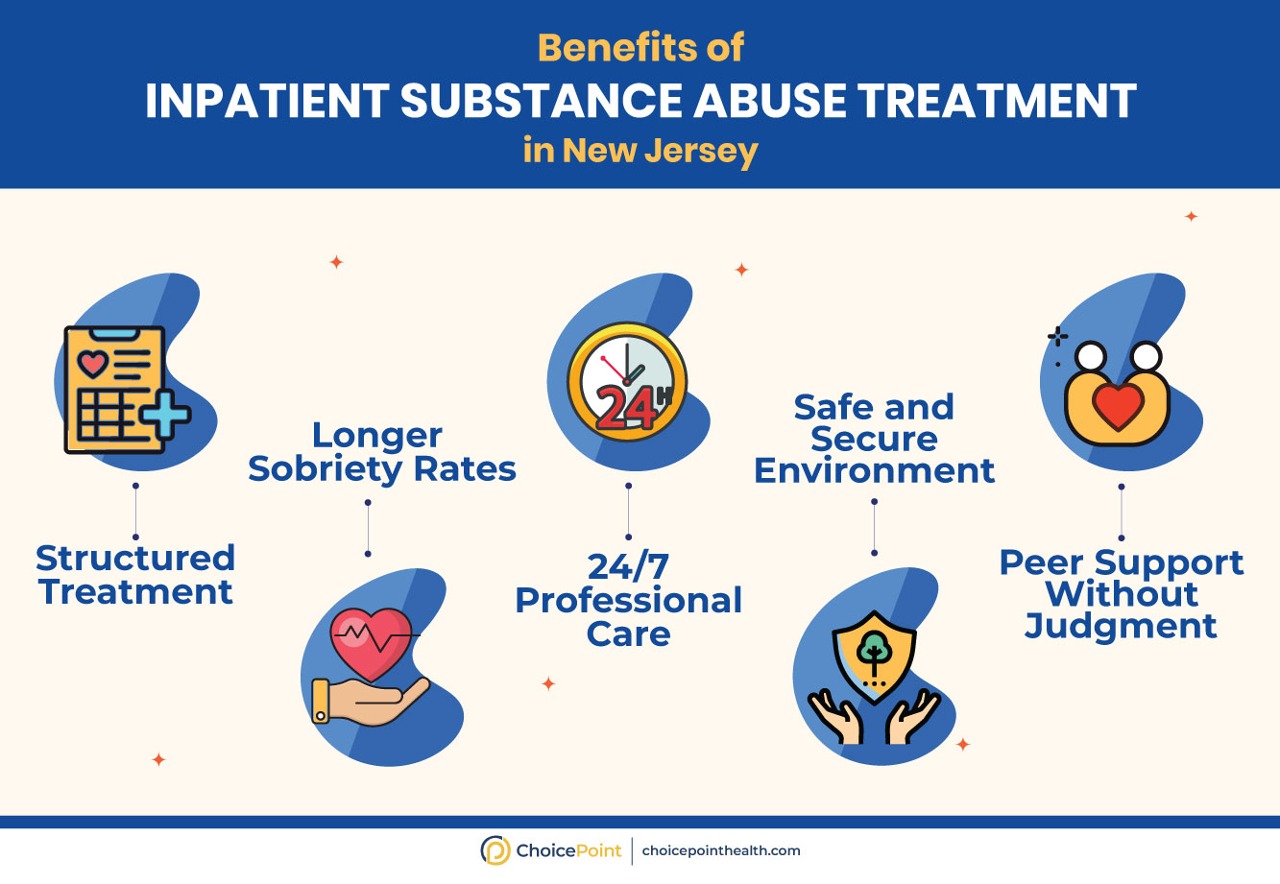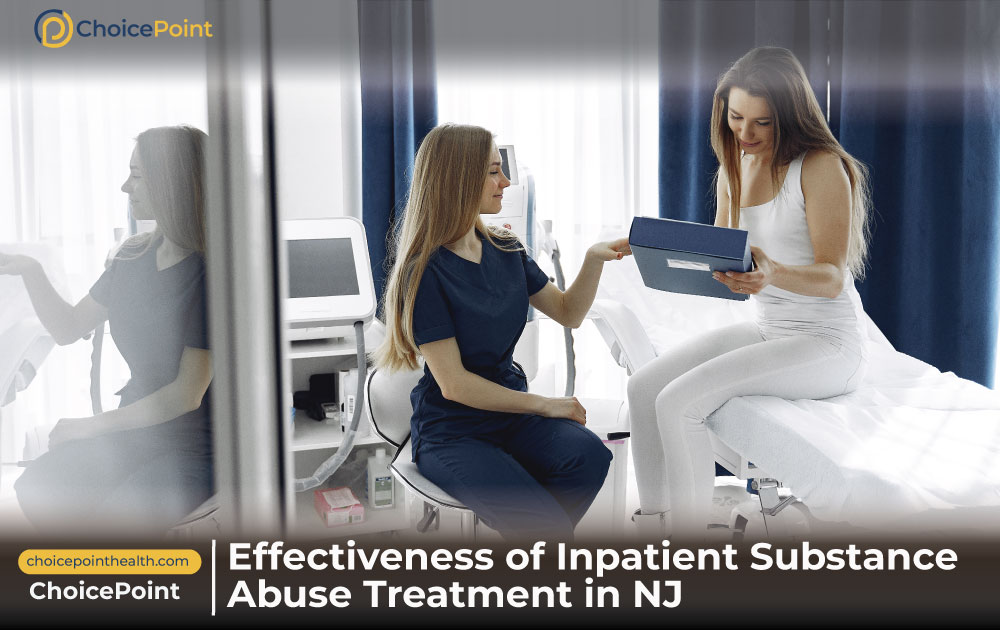In New Jersey, on average, 3,056 people died of drug overdose in the year 2021. A staggering number of individuals need comprehensive substance abuse treatment. However, unfortunately, only a few could get it due to limited resources and insurance-covered inpatient rehab centers. This blog will guide you about the effectiveness of inpatient substance abuse treatment in NJ. Let’s see how ChoicePoint can help you save yourself and your loved ones on the road to recovery.
To contact ChoicePoint, call 844.445.2563 now or complete this form!
Table of Contents
Inpatient Substance Abuse Treatment in NJ: What You Need to Know
Before seeking an inpatient treatment service, it is important to understand what substance abuse treatment covers:
- Alcohol Use Disorders
- Drug Use Disorders, i.e., opioid, cocaine, meth, etc.
- Other Addictions, i.e., tobacco.
Addiction treatment is not just a go, recovery, and get-back policy. It needs constant monitoring and complete mental rehab to overcome life challenges that can lead a person to relapse. When a person goes for inpatient rehab, they are struggling to quit certain addictive substances such as:
- Alcohol
- Cigarettes
- Marijuana
- Opioids
DEA-certified practitioners perform evaluation, detox, and psychotherapy at an inpatient rehab that collectively helps a person recover from substance use and carry on a path of sobriety and success.
The Process of Entering Inpatient Substance Abuse Treatment in NJ
Below is a step-by-step process of getting into an Inpatient rehab in NJ:
- Reach out to an esteemed inpatient treatment facility or healthcare professional.
- Express your intent to enter inpatient substance abuse treatment.
- Undergo a pre-admission assessment where a trained professional gathers essential information to determine the appropriate level of care.
- Provide insurance information for verification to ensure coverage for the inpatient treatment.
- The healthcare provider will identify any underlying medical issues impacting the treatment plan.
- Attend an orientation session to familiarize yourself with the treatment facility, including rules, daily schedules, and available resources.
- An addiction specialist will create an individualized treatment plan outlining specific therapies, counseling, and interventions tailored to your needs.
- Prepare personal belongings according to the facility’s guidelines and be ready to transition into the inpatient treatment environment.
- Seek support from family and friends.
- Begin Inpatient Substance Abuse Treatment in NJ by settling into the facility. Attend initial therapy sessions and adapt to the structured environment to support recovery.
5 Indicators of an Effective Inpatient Substance Abuse Treatment
Here are the top 5 indicators that show the effectiveness of Inpatient Substance Abuse Treatment in NJ:
- The body has stopped showing any negative signs, i.e., withdrawal symptoms
- A person can manage the challenges of stressful situations in regular counseling sessions
- Regular addiction assessments show positive reports and higher abstinence rates
- The body shows no signs of physical or chemical dependence of any sort, even after medical detoxification
- They have improved their social, work, and personal life relationships
Despite all these signs, substance abuse treatment effectiveness still depends on various other factors that we’ll discuss individually.
ChoicePoint, one of NJ’s best Inpatient rehabilitation facilities, provides an extensive, expert-evaluated treatment plan. Call Now 844.445.2563 to get Instant Help!

What is the Advantage of Inpatient Treatment Program?
Factors That Define the Effectiveness of Inpatient Substance Abuse Treatment in NJ
How effective an inpatient rehab can be depends on certain personal factors, including:
- The severity of the addiction
- Type of substance abused
- Duration of addiction
- Motivation to quit
- Type of treatment taken
- Duration of treatment
- Planning towards sobriety
Here are 7 factors to remember while opting for any inpatient rehabilitation facility in New Jersey. These factors can be crucial in determining the effectiveness of the substance abuse treatment as explained by NIDA:
a. Motivation, Commitment, and Dedication for Recovery
You have been through and seen a lot, and now it’s time to motivate yourself for a sober life. Once you are admitted to inpatient rehab, you have committed yourself, and now it’s time for a dedicated journey towards recovery. As Benjamin Alire Saenz said, “If you can quit for a day, you can quit for a lifetime.” These factors are the most important for a successful recovery.
b. Focused Care at the Inpatient Rehab
When you opt for inpatient substance abuse treatment in NJ, certain factors may increase or decrease the effectiveness, including:
- Staff
- Facilities
- Monitoring system
- Dedication to the duty
In addition, how focused you or your environment makes a lot of difference in achieving soberness altogether. Focused care may be provided through the following personalized addiction treatment programs:
Therefore, always consider choosing a personalized treatment plan for your needs and convenience.
c. Dual Diagnosis- A Prerequisite for Effective Rehab Treatment
The success rate of opting for substance abuse treatment at an inpatient rehab facility depends on how the clinicians assess a person’s condition. A person who has a mental disorder and addiction needs a specialized treatment program termed a Dual diagnosis. This covers:
- Substance Use Disorders, i.e., alcohol, opioids, etc.
- Mental Disorders, i.e., anxiety, depression, etc.
This helps in recovering from substance use comprehensively with mental disorder treatment.
d. Psychotherapies for a Mindful Recovery
For an inpatient substance abuse treatment to be exclusively effective and permanent. A person must go under different addiction therapies offered at the rehab facility in NJ:
- Cognitive Behavioral Therapy (CBT): Changing negative attitude into positive
- Dialectical Behavioral Therapy (DBT): Improving heightened emotions to prevent relapse
- Individual/ Group Therapy: Improving character and social flaws
- Family Therapy: Revitalizing relationships
These therapies join forces to strive to build a stalwart mindset against substance use and help a person achieve his life goals with normalcy.
e. Medication-assisted treatment to Assist Withdrawal
The most important aspect of inpatient substance abuse treatment and detoxification is Medication. This is a clinical withdrawal of toxication with the assistance of FDA-Approved medication for substance abuse treatments that includes:
- Suboxone for opioid withdrawal treatment
- Subutex for opioid, morphine, and heroin treatments
- Naltrexone for alcohol addiction and opioid cravings
- Buprenorphine for pain management and opioid dependence
The efficacy of these medications will depend on the individual dose and type of substance used.
f. Relapse Preventive Strategy
A study showed the substance abuse relapse rate to be 80-95% within one year of treatment. Relapse prevention is an essential aspect of a comprehensive substance abuse treatment that prevents the likelihood of getting back to old addiction by:
- Knowing potential triggers
- Nutritional therapy to reduce cravings
- Recreational activities to improve mindset and body, such as yoga and swimming
So, getting a relapse prevention plan from your inpatient substance abuse treatment facility will enforce better recovery outcomes.
g. Aftercare Plan
For substance abuse treatment to be permanent and lifelong, inpatient rehab will devise a carefully drafted aftercare plan that would include
- Regular follow-ups
- Timely counseling sessions
- History of relapses
- Trigger management
Finally, all the aspects will collectively assist a person to stay on the path of abstinence.
If you are looking for Inpatient rehabilitation facilities in New Jersey with all the prerequisites, then Contact ChoicePoint 844.445.2563.
ChoicePoint- The Best Inpatient Substance Abuse Treatment in NJ
To get admitted to our inpatient rehab in New Jersey, you may take the following steps:
- Contact our DEA-Certified staff for a quick and confidential consultation
- Discuss which Addiction Treatment Program suits your needs the best
- Confirm your insurance through commercial treatment programs and pocket payment options
- Travel to the rehab to get started with Medication-Assisted Treatment and Dual Diagnosis Treatment for addiction treatment
At ChoicePoint, we offer the following levels of care:
- Medical Detoxification
- Inpatient Rehabilitation
- High-intensity Outpatient (HIOP/PHP)
- Intensive Outpatient Program (IOP)
- Outpatient Treatment
- Aftercare and Continuing Support
- Medication Assisted Program (MAT)
So, verify your insurance and begin your treatment with ChoicePoint, which offers everything with extra care. Get in touch with us 844.445.2563 to learn more!
Most Asked Questions About Inpatient Substance Abuse Treatment in NJ
Following are some of the most asked questions regarding Inpatient addiction treatment in NJ:
What Should I Expect During the Screening Process?
- All screenings are strictly confidential.
- Based on the vital information acquired during your call, the doctor will determine the right level of care.
- Most phone screenings take roughly 10 to 15 minutes.
- If you do not qualify for withdrawal management, alternative levels of care will be offered. Moreover, referrals to appropriate programs will be made.
- To accelerate the screening process, be prepared to give information regarding your substance misuse, medical difficulties, insurance details, and mental health.
- Prepare your insurance information and a list of any medications you take for the screening.
Who Can Benefit Most from Inpatient Rehabilitation?
People with the following conditions may benefit most:
- PTSD
- Psychosis
- Substance abuse
- Clinical depression
How Long is Inpatient Substance Abuse Treatment in NJ?
They may last anywhere from 30 to 90 days, depending on:
- Severity of addiction
- Type of Insurance coverage
- Treatments offered
What if I Have a Relapse After Inpatient Treatment?
Do not be afraid of a relapse; even those who have been clean and sober for decades can and do relapse. If you relapse, you must be honest about it and figure out what caused it while continuing your outpatient aftercare treatment.
Does Inpatient Rehab Need to Inform a Patient’s Employer that They Are Going to an Inpatient Rehab?
No. Strict state privacy and confidentiality laws and regulations bind inpatient rehabs. They can only share information with the employer if the patient gives them written permission.
How Do I Get a Loved One to Go to an Inpatient Rehab?
When dealing with a loved one’s addiction, it’s necessary to express worry. It’s also critical to understand their preparedness for treatment. Inpatient rehabs are usually a free decision, and attempting to coerce someone may result in resistance.
Medical Disclaimer:
ChoicePoint aims to improve the quality of life for people struggling with substance use disorder and mental health issues. Our team of licensed medical professionals research, edit and review the content before publishing. However, this information is not intended to be a substitute for professional medical advice, diagnosis, or treatment. For medical advice please consult your physicians or ChoicePoint's qualified staff.











Review Effectiveness of Inpatient Substance Abuse Treatment in NJ.